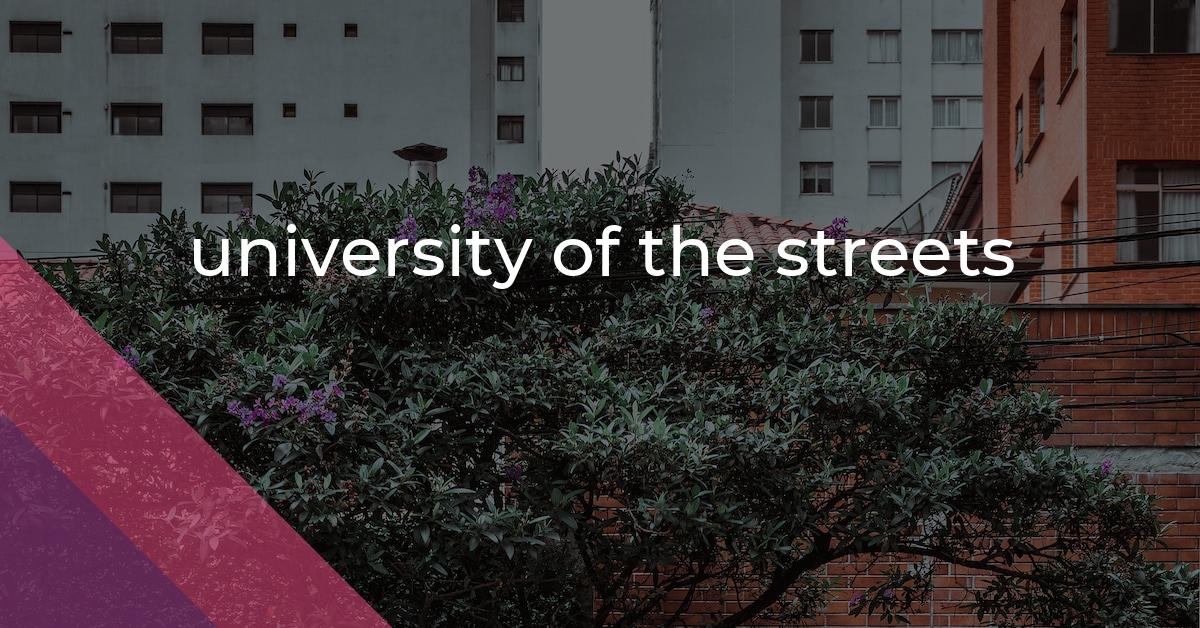university of the streets: Idiom Meaning and Origin
What does ‘university of the streets’ mean?
An idiom meaning a person has gained knowledge and experience through real-life situations and adversity, rather than formal education.

Idiom Explorer
The idiom "wise beyond one's years" is used to describe someone who displays a level of wisdom and maturity that is beyond what is expected for their age.
The idiom "university of life" refers to the real-world experiences and lessons one gains outside of formal education. It suggests that these experiences can be just as valuable, if not more, in shaping a person's knowledge and understanding of the world.
The idiom "through the mill" means to go through a difficult or challenging experience, often resulting in personal growth or resilience.
An idiom meaning to improve one's skills or performance in order to achieve better results or compete at a higher level.
The idiom "school of hard knocks" refers to the difficult or challenging experiences in life that teach someone valuable lessons, typically outside of traditional educational institutions.
The idiom *reality check* means a situation or event that helps someone understand and accept the truth or facts of a given situation.
An idiom meaning to be in a difficult or challenging situation that needs to be resolved or fixed. It implies being in a state of trouble or inconvenience.
The idiom "old hand" refers to someone who is experienced or skilled in a particular activity or job.
The idiom "make something of oneself" means to achieve success or become accomplished in a particular field, often through hard work and determination.
The idiom "land on one's feet" means to recover or be successful after a difficult or challenging situation. It suggests being able to adapt and find a positive outcome despite the circumstances.
Unorthodox Learning
The university of the streets is an idiom that has its roots in African American Vernacular English (AAVE), but has now become widely used in mainstream American English. It conveys the belief that one can acquire knowledge and skills through real-life experiences and street smarts, rather than relying solely on formal education.
This idiom emphasizes the notion that the streets can provide a valuable learning environment, teaching individuals important life lessons and survival skills that may not be learned in a traditional classroom setting. It underlines the idea that practical knowledge gained through firsthand experiences can be just as, if not more, valuable than theoretical knowledge obtained from books.
When we think of the university of the streets, we envision a place where resilience, adaptability, and resourcefulness are nurtured. It symbolizes the ability to navigate and thrive in challenging circumstances, relying on one's street smarts and intuition.
The university of the streets shares a similar meaning with idioms such as "university of life," "school of hard knocks," and "better for it." All these expressions encapsulate the idea that practical experience and real-life challenges can serve as valuable teachers.
"University of life" is an idiom that refers to the idea that life itself is a school or university, where experiences and hardships serve as valuable lessons. This idiom aligns closely with the university of the streets, emphasizing the importance of learning from real-life situations.
"School of hard knocks" is another idiom that conveys a similar meaning to the university of the streets. It suggests that the challenges and difficulties one faces in life can provide valuable education and character development. The university of the streets embodies this concept by highlighting the practical knowledge gained through navigating the streets and facing adversity.
"Better for it" is an idiom that signifies the idea that one has gained something valuable from a challenging experience. It implies that despite the hardships faced, the individual has grown, learned, and become stronger as a result. The university of the streets embodies this sentiment, emphasizing the personal growth and development that can be achieved through navigating the challenges of street life.
While the precise origin of the university of the streets idiom is difficult to pinpoint, it is believed to have originated within African American communities, particularly those facing socio-economic challenges. For marginalized individuals who may not have had access to formal education, the streets became their classroom, offering practical lessons on survival, hustling, and self-reliance.
Urban environments and inner cities, often associated with higher crime rates and limited economic opportunities, came to symbolize the metaphorical "streets" representing the hardships and struggles of life. The idiom reflects the idea that one can acquire an education through direct experience and observation within these challenging contexts.
Over time, the university of the streets idiom has broken through its original context and is now embraced by individuals from a variety of backgrounds. It demonstrates the importance of street smarts and practical knowledge in navigating the complexities of modern society.
It is important to note that while the university of the streets idiom carries positive connotations, it does not downplay or diminish the value of formal education. Instead, it underscores the potential for learning and growth that can occur outside of traditional educational institutions.
The university of the streets idiom captures the essence of practical knowledge gained through real-life experiences and highlights the resilience and resourcefulness of marginalized communities. While it has gained broader usage, it is crucial to recognize that it does not negate the significance of formal education. Instead, it suggests that there are multiple paths to learning and success, with the streets serving as an alternative educational environment.
Example usage
Examples of how the idiom "university of the streets" can be used in a sentence:
- She had no formal education but the university of the streets taught her how to survive in the real world.
- He learned valuable life lessons from his time in the university of the streets.
- The book provides insights into the education one can gain from the university of the streets.
More "Education" idioms



